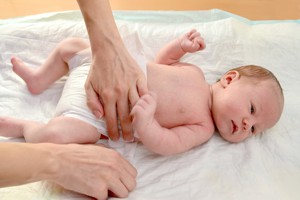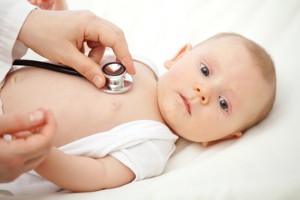 Despite our best efforts when it comes to food hygiene, diarrhoea in our new-borns is almost inevitable. It’s an unpleasant rite of passage that most young children will endure at some point. This is largely thanks to the fact that a baby’s gut is still developing and may not be able to combat all of the germs that find their way in.
Despite our best efforts when it comes to food hygiene, diarrhoea in our new-borns is almost inevitable. It’s an unpleasant rite of passage that most young children will endure at some point. This is largely thanks to the fact that a baby’s gut is still developing and may not be able to combat all of the germs that find their way in.
Whilst the symptoms lead little to be desired, and result is even less sleep for Mum, Dad, and Baby, most of the time diarrhoea is harmless and will clear up within about a week.
What are the Symptoms of Diarrhoea in Babies?
New-borns are known for pooping. In fact, in the early days, your newborn will probably poo several times a day, usually during, or just after a feed. In very simple terms, space is at a premium in your baby’s tummy and must be made for more milk to be taken in.
For this reason, many parents worry that their newborn has diarrhoea when the reality is that nature is simply taking its course. Normal poo for a breast-fed baby is very soft, mushy, often liquid-like, and mustard yellow. For formula-fed babies the poo will be closer to a yellow-brown colour and slightly firmer. It’s also smellier.
If your baby has frequent (more frequent than usual) watery poo with little or no lumps, then it’s more likely to be diarrhoea. Older babies with diarrhoea may have lots of undigested food present in their stools, in addition to stools with a watery consistency. Your baby may also have some vomiting, and a fever.
My Baby Has Diarrhoea – Do I Need To Call A Doctor?
 Generally, diarrhoea can be treated at home without the need for a Doctor’s involvement. However, with younger babies in particular, it can be very serious as it can cause dehydration. If your baby is showing signs of dehydration you should seek medical advice.
Generally, diarrhoea can be treated at home without the need for a Doctor’s involvement. However, with younger babies in particular, it can be very serious as it can cause dehydration. If your baby is showing signs of dehydration you should seek medical advice.
Signs of dehydration include:
- Sunken soft spots on the baby’s head
- Skin that doesn’t immediately go back into place when gently pinched
- Fewer or no wet nappies or very dark yellow urine
- No tears when crying
- Drowsy / lethargic
- Cold hands and feet
You should also call the doctor, if along with diarrhoea, your baby has vomiting that lasts for more than 24-hours, a high fever, a swollen stomach, blood in stools, or is refusing to take any fluids for eight hours or more.
Treating Diarrhoea In Babies At Home.
If you are treating your baby’s diarrhoea at home, then keep offering them fluids. You can also offer your baby a few sips of an oral rehydration sachet after each bowel movement. These are available from pharmacies and supermarkets.
If your baby has started solids then you can give them foods from what is known as the BRAT diet – i.e. Bananas, Rice, Apple Puree, and Toast. These foods are low in fibre so tend to solidify better in your baby’s tummy during diarrhoea. However, if your baby is unwilling to eat, try not to worry and offer them food again a bit later. It is more important that your baby takes in fluids.
Your baby may develop nappy rash whilst having diarrhoea, thanks to the volume of poo that they are passing, and the acidic nature of that poo. Use cotton wool and water to clean your baby’s bottom as this is gentler than wet wipes. Try and give your baby some nappy free time, lining your carpet with old towels if necessary, and use a barrier cream on your baby’s bottom.
Most bouts of diarrhoea are caused by viruses, so make sure you wash your hands before and after changing your baby’s nappy, after using the toilet, and before eating to prevent the spread of infection. Disinfect your baby’s changing mat and sterilise any feeding equipment your baby may have.
Continue to monitor your baby closely, and contact the Doctor if you have any concerns.
